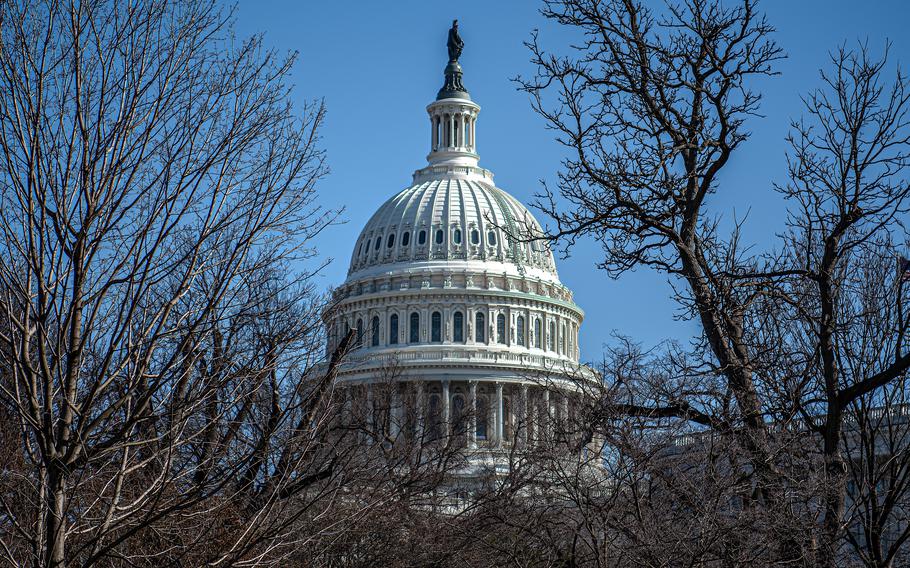
The U.S. Capitol building is seen Feb. 29, 2024, in Washington, D.C. (Carlos Bongioanni/Stars and Stripes)
WASHINGTON — Congress is set to vote this week on a proposed fiscal 2024 budget for the Department of Veterans Affairs that increases funding for veterans’ health care and other benefits by $24 billion while eliminating conservative policies pushed by House Republicans.
The $346.7 billion legislation, which funds the VA as well as military construction projects through Sept. 30, is the result of months of negotiations and follows multiple stop-gap funding measures that repeatedly brought the VA and other government agencies to the brink of shutdown since the beginning of the fiscal year on Oct. 1.
The House is expected to consider the bipartisan bill first, followed by the Senate. Both chambers approved a short-term funding extension last week that requires Congress to sign off on the VA’s budget by March 8 to avoid a shutdown.
“We are proud to be keeping the government open without cuts or poison pill riders,” Senate Majority Leader Chuck Schumer, D-N.Y., said in a statement praising the bipartisan spending deal on Sunday.
The ‘poison pill riders’ include measures that would have limited veteran access to abortion, curtailed diversity, equity and inclusion initiatives, prohibited surgical procedures or hormone therapies for gender-affirming care and limited the ability to fly flags at VA facilities, which Democrats said targeted the display of pride flags.
The VA on Monday finalized its policy of providing abortions to veterans and dependents in cases where a pregnancy is the result of rape or incest or if the mother’s life is at risk. The policy was implemented on a temporary basis after the Supreme Court overturned Roe v. Wade in 2022 and had been repeatedly challenged by Republicans.
Other Republican provisions scrapped from the final version of the VA’s proposed spending bill would have hindered efforts to address climate change and prohibited the enforcement of coronavirus mask mandates and vaccine requirements for health care personnel.
Republicans were successful, however, in pushing through a measure that protects veterans’ gun rights. The provision prevents the VA from automatically reporting veterans who are found incapable of managing their own finances to a national background check database that is used to determine whether a person is legally prohibited from buying a firearm.
“No veteran should lose their constitutional right to bear arms simply because they need help managing their finances, and if they are a danger to themselves or others, a judge should make that decision — not a VA bureaucrat,” said Rep. Mike Bost, R-Ill., chairman of the House Veterans’ Affairs Committee.
Much of the spending bill is focused on investments in medical care for veterans and other beneficiaries. About 7.4 million patients are expected to be treated by the VA in fiscal 2024 for routine health issues as well as exposure to toxins during military service, according to a summary of the VA budget bill.
The legislation allocates $121 billion for health care, including $16.2 billion for the nearly 2 million veterans who receive mental health services as well as $990 million specifically for women’s health care. About $230 million will be spent on helping more than 550,000 veterans who had a diagnosed substance abuse disorder in 2022.
More than $3 billion is dedicated to enhancing the VA’s ability to reach and assist homeless veterans, who numbered 35,574 during the most recent homelessness survey in January.
“This bill honors the sacred obligation we have to take care of our veterans when they come home by fully funding veterans’ medical care and benefits and delivering essential resources VA needs to operate,” said Sen. Patty Murray, D-Wash., chairwoman of the Senate Appropriations Committee.
The bill also includes $18.7 billion for military construction, which is $2 billion more than requested by the White House.
About $2 billion will be spent on improving family housing, $1.5 billion will be spent on the construction or renovation of facilities for troops in the National Guard and the Reserve, and $662 million will fund the design and construction of more than a dozen barracks.
Housing conditions, especially for junior personnel, have been heavily scrutinized by lawmakers in recent years due to frequent reports of mold, rodent infestations and other poor living conditions.
The bill will also provide more than $330 million for child development centers to help address persistent child care shortages on military bases.